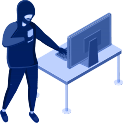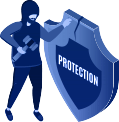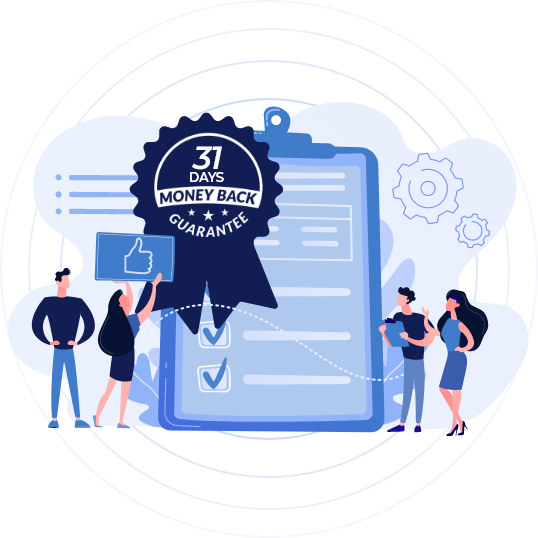IP address is abbreviated for Internet Protocol address. It is a unique number allotted to any device that connects to the internet. They device may be your phone, laptop or tablet.
IP Version 4 and IP Version 6 are two versions of Internet Protocol that are in use presently. These versions have 2 prime functions to carry which are identification and location addressing. The different between the two is that IP Version 4 results in 4 billion addresses approximately whereas IP version 6 results in 3.4 x 1038 addresses.
An IP address is necessary to go online. It allows the two devices – of sender and receiver – to connect and exchange information. Without it, the two devices won’t know where to send or retrieve information from.
Country
City
Province/State
ZIP code/Postal
The landing websites can reveal even more. They combine your IP address with more information gathered and extracted from metadata, trackers, cookies, owners of website, advertisers and marketers. By doing this, it is easy to build an entire profile about you. These pieces of information are put together along with the websites you visit, the kind of content piques your interest and who you communicate with. After that, you are either targeted for marketing and shown content and advertisement that may suit your liking or your data is sold to the person bidding highest.
Internet Service Providers (ISPs) are party to even more information. Your ISP knows more in-depth personal information about you than your friend. Being their customer they are aware of your name, address, cell number, bank account details, credit card number, credit history and maybe even more.
Countless countries, including UK and Australia, have ISPs maintain logs of your browsing history as they per a requirement. These browsing activity logs are handed over to multiple government agencies who don’t even need a warrant to acquire such information. Your internet provider can see any website you visit, if it is not HTTPS secured. Websites that are HTTPS secured only exclude the individual pages you visit from being monitored, your domains can still be scrutinized regardless.
Most users often wonder, “What is my IP address when I connect to a proxy or a VPN or even enter a website?” or “Is there a difference between a private IP and a public IP address?”
The short answer is private networks utilize a private IP address. This is to help all kinds of information being shared over connecting devices be identified with or without the internet. This is the complete opposite of a public IP address.
Every device over your home network gets a distinct private IP address. This is to help all devices communicate with other devices. However, it solely is only for home network devices and nothing outside of it.
Using the DHCP protocol, every device over your home network is assigned a unique IP address by the router. Public IP addresses, on the other hand, are addresses needed to connect to the internet. Unlike private IP addresses, public IPs are routed via the internet.
Finding your public IP address is pretty straightforward. Simply scroll above and take a look at our “What is my IP address” tool. This will reveal your public IP, the internet service provider you’re connected to, your city, region, country, the browser you’re using, the operating system you’re utilizing, and even your device’s screen resolution. This tool is the best to check your IP address when connected to FastestVPN. Once your public IP address is different after connecting to the VPN, it means the VPN is working, and nothing is exposed.
When you connect with FastestVPN, you can look up your IP address on your device manually too. Here are a few devices that you can look it up on:
To find your IP address on Android, here’s what you need to do:
If you’re connected to the Wi-Fi, here’s how to find your IP address:
If you need to find your phone IP address on iOS, here’s what you should do:
If or when using Wi-Fi, here’s how to find your device IP address on Mac:

Changing your IP address or hiding it altogether is not a complex task. All you need is Fastest VPN.
By virtually putting you in an alternate area, a VPN will change your IP address. While using a VPN, your web traffic is directed through an encrypted tunnel with the goal that nobody, not even your Internet Provider, can keep track of what you're doing on the web.
A VPN will influence it to appear as though you are in the same place as the location of the server. For instance, if you are in the Australia, you connect with a VPN location in Denmark, you will have all the earmarks of being in the Denmark. There are many favorable outcomes to utilizing a VPN to conceal your IP:
Encrypts your web information so you can be online with greater security.
Hides your real location
Giving you a better web experience, free of censorship or other firewall confinements by enabling you to effortlessly switch between virtual locations.

Your IP address can be easily extracted by someone who uses your computer. They can simply go to WhatIsMyIPaddress.com and find out. Your IP, city, country, etc, pops right up!

If your home Wi-Fi isn’t password protected or secure enough, then a stranger can intrude and tap into your network and easily find
out your IP address.

Your IP address can be easily extracted by someone who uses your computer. They can simply go to WhatIsMyIPaddress.com and find out. Your IP, city, country, etc, pops right up!

Each time you visit a website, you leave a mark behind, which is your IP address. The website has it logged on their web servers and can then review all IP addresses to see what their visitation is

When you join forums to express views and share ideas, your IP address allows the administrator
to identify the location
of your computer.

Contributing to a discussion through comments on blog posts is also how someone may get your IP address. This is because as you post your opinion, the administrator of the blog can uncover your computer location.

Social media does not reveal your IP address to users like
yourself. Though, the site admins
know it and if you click on
third party ads,
then they do too.

The use of messaging apps, such as Whatsapp, doesn’t reveal your IP address to the person you are engaging in a conversation with. However, if there is a link shared in the message and you click on it, then the website has access to your IP.

Towards the end of 2016, a bill was turned into law which gave authorities like FBI more flexibility when investigating online activities. To get subpoenas for IP addresses became much easier
then.

Relax: Most Internet/email providers today no longer include the email address of someone sending an email. But smaller Internet Service Providers or people who set up their own email server which might still be revealing their IP address. Try our trace email
You're fighting a losing battle when it comes to preventing someone from capturing your public IP address. But that doesn't
mean all is lost. You can get the upper hand in this cat-and-mouse game of shielding your IP address from the world.
FastestVPN has over 21+ servers spread across numerous countries. This provides a private, secure and free browsing experience! We can be trusted and relied upon because we have a stringent policy of keeping no logs of activity and connection. This guarantees that see your browsing activity. Simultaneously, your data is fully secure through 256-bit encryption.
If securing your privacy is your priority, get Fastest VPN now to protect you from people seeing your online activity!
Don't miss out!
